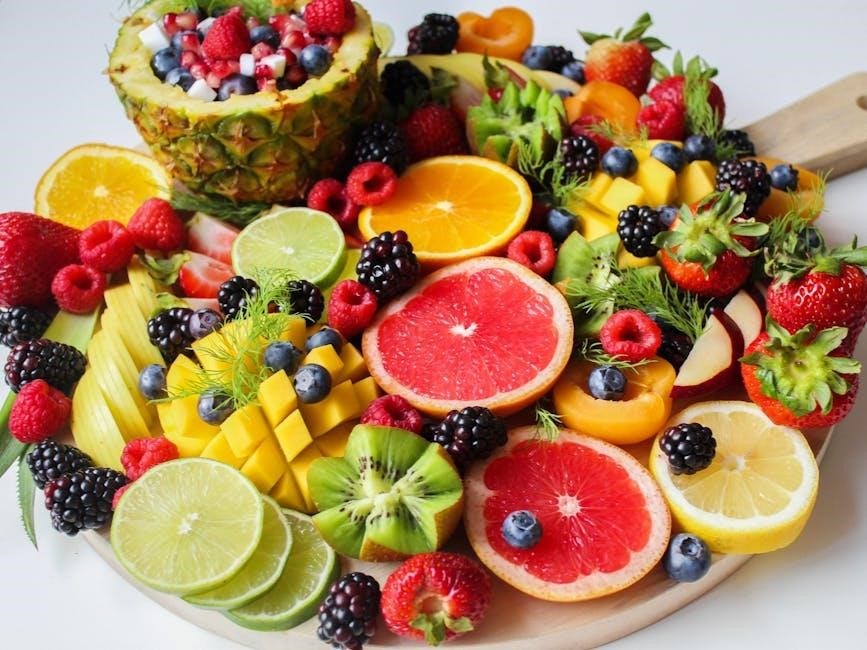
A cholecystitis diet focuses on reducing gallbladder inflammation by avoiding fatty foods, improving digestion, and minimizing bile strain. It emphasizes balanced nutrition to manage symptoms and aid recovery effectively.
Understanding Cholecystitis and Its Impact on Diet
Cholecystitis, an inflammation of the gallbladder, often stems from gallstones blocking bile flow, causing pain and digestive issues. This condition necessitates dietary adjustments to alleviate symptoms and support recovery. A key aspect of managing cholecystitis is reducing fat intake, as fatty foods trigger bile release, potentially worsening inflammation. Avoiding fried, greasy, and high-cholesterol foods helps minimize gallbladder strain. Additionally, smaller, frequent meals are recommended to ease digestion and prevent bile stagnation. Ignoring dietary advice may lead to prolonged inflammation or gallstone formation. A tailored diet not only addresses symptoms but also supports long-term gallbladder health, reducing the risk of complications.
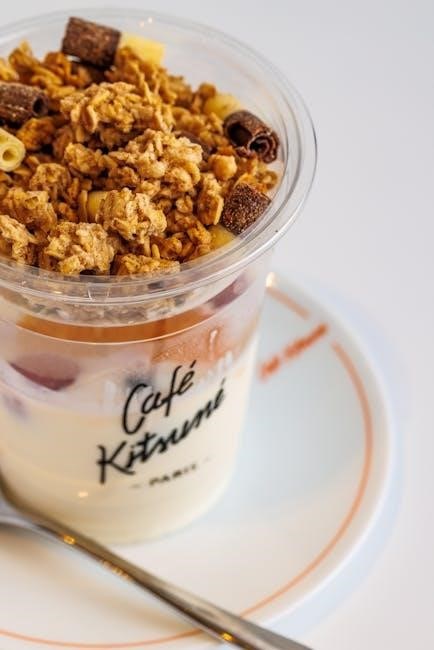
Causes and Risk Factors of Cholecystitis
Gallstones, high-fat diets, obesity, and diabetes increase the risk of cholecystitis. Family history and certain medical conditions also contribute to its development and complications.
Role of Diet in Cholecystitis Development and Management
Diet plays a crucial role in both the development and management of cholecystitis. A high-fat, high-sugar diet can increase the risk of gallstone formation, which often leads to inflammation. Conversely, a balanced diet low in saturated fats and refined sugars can help reduce inflammation and alleviate symptoms. Foods that trigger bile production, such as fatty or fried options, should be avoided to prevent gallbladder strain. Incorporating fiber-rich foods, lean proteins, and healthy fats supports digestion and bile health. Hydration and regular, small meals are also recommended to avoid overburdening the gallbladder. A well-structured diet not only aids in recovery but also helps prevent future episodes, making it a cornerstone of cholecystitis management.
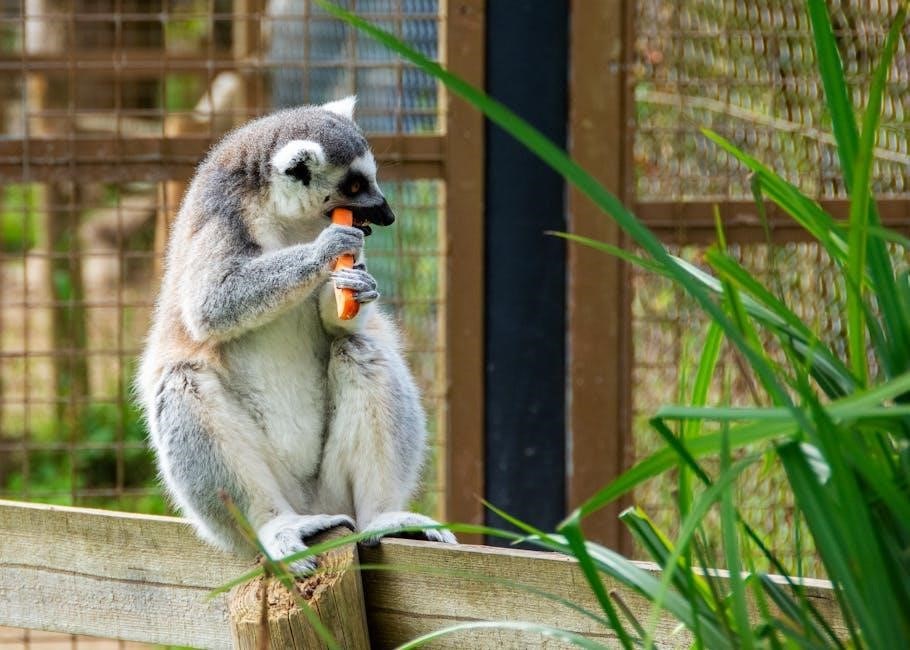
Overview of the Gallbladder and Bile Function
The gallbladder stores bile, produced by the liver, aiding fat digestion and vitamin absorption. Its function is vital for nutrient processing, linking directly to dietary choices in managing gallbladder health.
How Diet Affects Gallbladder Health
Diet plays a significant role in gallbladder health, as it directly influences bile composition and gallbladder function. Consuming high-fat or fried foods can trigger gallbladder inflammation, while low-fiber, high-cholesterol diets increase gallstone risk. A balanced diet rich in fruits, vegetables, and whole grains supports bile production and reduces inflammation. Hydration and frequent, smaller meals help prevent bile stasis, a common issue in gallbladder disease. Avoiding processed foods and excessive sugar further protects the gallbladder from dysfunction. Overall, a mindful eating approach can prevent complications and support recovery, making dietary choices central to gallbladder health management.
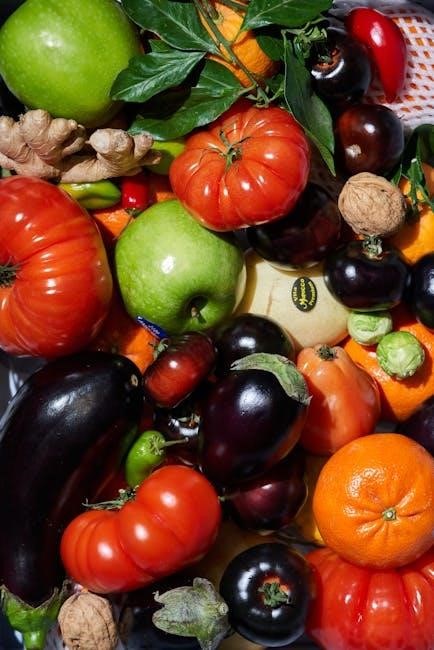
Dietary Management of Cholecystitis
Dietary management involves avoiding fatty and fried foods to reduce gallbladder inflammation. A tailored diet promotes recovery by minimizing bile strain and supporting digestive health effectively.
Diet No. 5 and 5a are therapeutic diets designed for individuals with gallbladder conditions. Diet No. 5 is tailored for chronic cholecystitis, promoting recovery with moderate fat intake, while Diet No. 5a is for acute cases, significantly reducing fat consumption to minimize gallbladder strain. These diets emphasize lean proteins, low-fat dairy, and fiber-rich foods, avoiding fried and fatty options. They aim to restore gallbladder function and prevent further inflammation. Both diets are structured to be easy on the digestive system, ensuring proper nutrient absorption while managing symptoms effectively. Adherence to these dietary plans is crucial for recovery and long-term gallbladder health.
Foods to Avoid: Fatty and Fried Options
Fatty and fried foods are primary culprits in triggering gallbladder inflammation. They overload the gallbladder, forcing it to release excessive bile, which can exacerbate cholecystitis symptoms. Fried meats, butter, margarine, cream, and oils are high in saturated fats and should be strictly avoided. Processed foods, fast food, and high-fat snacks also fall into this category. Even healthy fats, when consumed in excess, can strain the gallbladder. Patients are advised to eliminate these foods to reduce inflammation and aid recovery. Instead, opting for low-fat alternatives and baking or steaming foods can help manage symptoms effectively and support overall gallbladder health.

Recommended Foods for a Healthy Gallbladder
A healthy gallbladder diet emphasizes low-fat, nutrient-rich foods to reduce inflammation and support digestion. Lean proteins like poultry, fish, and plant-based options are ideal. Whole grains, such as oatmeal, brown rice, and quinoa, provide fiber, aiding digestion and bile function. Vegetables like spinach, carrots, and cucumbers are beneficial, while fruits such as berries and apples offer antioxidants. Low-fat dairy, including skim milk and cottage cheese, is recommended. Healthy fats like avocado and olive oil should be consumed in moderation. Drinking plenty of water and incorporating herbal teas helps flush toxins. Portion control is key to avoid overburdening the gallbladder. These foods promote healing, reduce symptoms, and support long-term gallbladder health, making them essential for managing cholecystitis effectively.
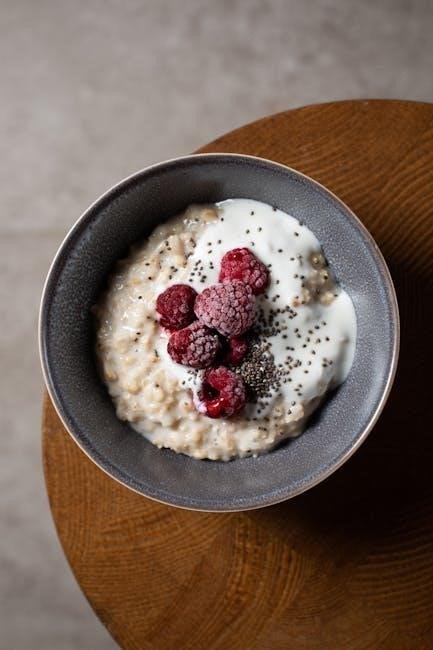
The Science Behind the Cholecystitis Diet
The cholecystitis diet is rooted in scientific research, focusing on reducing fatty intake to minimize gallbladder inflammation and support bile function, as shown in studies by PE Ivanova and others.
Studies on Diet Effectiveness and Patient Rehabilitation
Research highlights the importance of dietary adjustments in managing cholecystitis. Studies by PE Ivanova and GM Nikolaev emphasize that a low-fat, balanced diet reduces inflammation and supports gallbladder function. Diet No. 5a, often recommended, focuses on minimizing fatty foods and promoting bile health. Patient rehabilitation is significantly enhanced through adherence to these dietary guidelines, which help prevent gallstone formation and alleviate symptoms. Scientific evidence underscores the effectiveness of such diets in both acute and chronic cases, demonstrating improved recovery rates and reduced complications. These findings reinforce the role of nutrition as a cornerstone in cholecystitis management, offering a non-invasive yet impactful approach to healing and long-term gallbladder health.
Role of Scientific Research in Dietary Recommendations
Scientific research plays a pivotal role in shaping dietary recommendations for cholecystitis patients. Studies by researchers like PE Ivanova and GM Nikolaev have demonstrated that specific dietary adjustments can significantly reduce gallbladder inflammation and improve bile function. These studies emphasize the importance of minimizing fatty and fried foods, which are known to trigger gallbladder issues. The development of diets like No. 5a is directly supported by scientific evidence, ensuring they meet the nutritional needs of patients while addressing gallbladder health. Research also highlights the benefits of balanced nutrition in preventing gallstone formation and alleviating symptoms. By aligning dietary advice with scientific findings, healthcare providers can offer evidence-based recommendations that promote recovery and long-term health for individuals with cholecystitis.
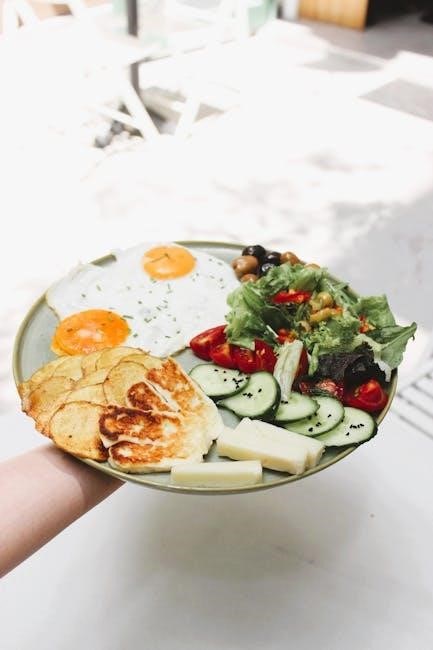
Lifestyle Modifications for Gallbladder Health
Adopting a healthy lifestyle involves staying hydrated, eating smaller meals, and exercising regularly to support digestion and gallbladder function, reducing the risk of inflammation and gallstone formation.
Importance of Hydration and Meal Frequency
Proper hydration and meal frequency play a crucial role in managing cholecystitis. Drinking plenty of water helps thin bile, reducing the risk of gallstones and improving digestion. Eating smaller, more frequent meals ensures the gallbladder isn’t overwhelmed, preventing inflammation. A diet with 5-6 small meals daily can ease digestive strain. Avoiding heavy, fatty meals reduces bile concentration, lowering inflammation risk. Incorporating water-rich foods like cucumbers and celery supports hydration. Additionally, limiting caffeine and alcohol, which can dehydrate, is essential. Balanced hydration and meal timing help maintain gallbladder health, preventing cholecystitis flare-ups and promoting overall well-being.
Exercise and Stress Management
Regular exercise and effective stress management are vital for gallbladder health. Physical activity, such as walking or yoga, can improve digestion and reduce gallstone risk. Stress triggers inflammation, which can worsen cholecystitis symptoms. Practices like meditation, deep breathing, and mindfulness help minimize stress. Combining moderate exercise with relaxation techniques promotes overall well-being and supports dietary efforts. A balanced lifestyle reduces inflammation, enhances bile flow, and aids in recovery. Managing stress and staying active are key components of a holistic approach to managing cholecystitis, complementing dietary changes for better health outcomes.
A cholecystitis diet offers preventive and recovery benefits by reducing inflammation, improving digestion, and enhancing gallbladder function, promoting long-term health and well-being effectively.
Preventive and Recovery Benefits of Dietary Changes
Dietary changes play a crucial role in both preventing cholecystitis and aiding recovery. By avoiding fatty and fried foods, individuals can reduce the strain on the gallbladder, minimizing inflammation and the risk of gallstones. A diet rich in lean proteins, whole grains, and fruits supports digestion and bile function. Hydration and regular, smaller meals further enhance digestive health. These adjustments not only alleviate symptoms but also prevent future episodes. For those recovering from cholecystitis, adhering to diets like No. 5 and 5a helps manage symptoms and promotes healing. Over time, these dietary modifications can significantly improve overall well-being and reduce the likelihood of complications, making them a cornerstone of long-term gallbladder health management.